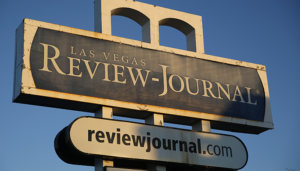The image you see with this blog illustrates what I did for a living for nearly 37 years. I took notebooks such as this with me to jobs in Oregon and then to Texas.
I mention this notebook today because we have returned from visiting the last stop on my professional journey. I came away with a huge trove of good feelings, seeing old friends, celebrating my son’s birthday and enjoying the unseasonably warm weather under a bright Texas Panhandle sun.
However, I also came away with a feeling of sadness. You see, the newspaper that summoned my wife and me there 25 years ago has all but vanished. The Amarillo Globe-News used to be a towering presence in the community. It has been decimated, reduced to a tiny fraction of its former self.
The Globe-News’s building — at the corner of Ninth Avenue and Harrison Street — is empty. Its signage has been stripped off the exterior wall. There’s an “AVAILABLE” sign on the property. What’s left of the operation has moved into Suite 103 inside the tallest building in Amarillo, a 31-story bank tower down the street and around the corner.
News racks? Where they sell single copies of the Globe-News? I didn’t see a single one anywhere. I was told that convenient stores still sell the paper. I had a thought about buying the paper, but then I realized I would shell out more than $3 for a journal that would have little news of interest to me. I took a pass.
I guess it’s a sign of the times and the changing media era into which we are still plunging. My previous professional stop, in Beaumont, way down yonder on the Gulf Coast, is undergoing similar retrenchment. It, too, has all but vanished. The newspaper still operates out of its historic structure at 380 Walnut Street, but the corporate owners are looking for a smaller site to house its diminished staff. The Enterprise will vacate that site eventually, although the Hearst Corp., which owns the newspaper, is a proven media company with much greater newspaper chops that Morris Communications, which sold all its properties — including the Globe-News — and then closed its newspaper operation.
That ain’t all, man. My first professional stop, the Oregon City (Ore.) Enterprise-Courier has vanished. It closed completely in the late 1980s. Its parent company — Scripps League Newspaper — sold all its remaining properties and then ceased functioning altogether.
I am saddened by what has happened to print daily journalism. It was driven home to me this weekend on a return to Amarillo. The fellowship of friends was wonderful. The absence of any tangible evidence of the newspaper where I once practiced my craft with great joy and excitement, though, pains my heart.
But … retirement from all of that remains equally joyful and full of adventure.




